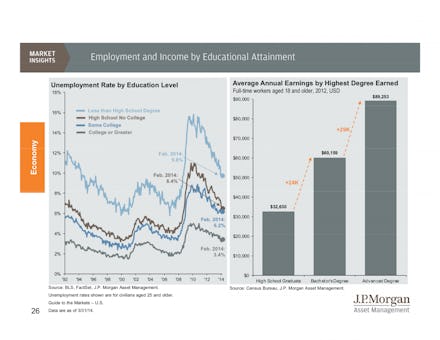Everyone Is Asking if College Is Still Worth It, and This Chart Has Your Answer

With the rising costs of a college education and climbing unemployment rates, prospective college students are increasingly asking whether a traditional four-year education is really worth the time and money. Public and private college tuitions have undergone dramatic increases over the years, making a secondary education a more and more burdensome investment. So, after all that money is spent, all those loans are taken on, all that potential money-earning time and wasted, is it worth it? Yes.
According to a recent report by the bank and financial services company JPMorgan, unemployment is noticeably lower and average annual earnings are significantly higher for bachelor's and advanced degree holders than those with a high school degree or less. Check out this simple chart for the breakdown.
Image Credit: Business Insider
As the charts show, the unemployment rate for those with a college degree is half of that for those with some college education but no degree or no college education at all, and a bachelor's or advanced degree greatly increases your earning potential. And if we do a bit of quick math, assuming an average career lasts 46 years (spanning ages 21 to 67) and taking the average annual earnings reported by JPMorgan, over the course of a life, someone with a high school degree could earn $1,488,566, whereas someone holding a bachelor's degree could make $2,767,314, while an advanced degree-holder could expect as much as $4,105,638 over those years. When you think of it like that, the answer becomes pretty simple: yes, you should go to college.
However, not all degrees are created equal. A recent report by the research firm PayScale that was highlighted in the Economist shows that while some schools like the University of Virgina, Harvard and William and Mary offer great returns on investment over 20 years, some schools, such as Shaw University, Fayetteville State University and the College of the Ozarks, actually offer a negative return on investment when compared to a standard 20-year treasury bill. That means, financially speaking, you'd be better off just letting your money sit in a treasury bill and doing nothing than attending one of these schools.
Of course, because these analyses solely consider the financial investment and eventual return on investment (or lack thereof) of a college degree, they completely disregard the actual knowledge and human growth most students gain over those four years. While some would argue that college doesn't actually make you smarter or that you could get the same education from a top-tier institution as you'd get for $1.50 in late charges at a public library, these arguments ignore a couple things. First, these ideas treat college as a factory for putting out degrees rather than institutions of real learning where new ideas are constantly generated. And second, and more substantially, they also largely ignore the fact that more and more positions and employers require a formal education to, if nothing else, sort out potential candidates for employment. As problematic of a system as it might seem, it's a lot easier for someone to trust a college degree than your word.
So, if you're still wondering if you should go to college or if going was the right decision, just remember that despite whatever hardships it might bring, chances are, it's worth your time, effort and money.